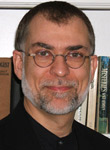Land-grant schools are democracy's colleges
By Scott Peters

As the land-grant university of New York, Cornell has shown its commitment to a civic mission most recently through the new Center for Community Engaged Learning and Research and a new Provost's Fellow for Public Engagement. Associate professor of education Scott Peters is now helping to lead a national effort to deepen the civic identities of all American educational institutions as a member of the American Commonwealth Partnership, which launches a yearlong campaign at the White House Jan. 10. The event will be live streamed at http://www.whitehouse.gov/live. Early portions of the event will be shown from 2-4 p.m. ET, and U.S. Secretary Arne Duncan's remarks on connecting college, career and citizenship will air live at 5:30 p.m.
On July 2, 1862, President Abraham Lincoln signed the first Morrill Act into law. Also referred to as the Land Grant Act, it offered states grants of federal land to establish a new kind of college that would, in the language of the act, "promote the liberal and practical education of the industrial classes in the several pursuits and professions in life." It was the first of several federal acts that built and supported what became known as the "land-grant system." Today this system includes 109 institutions located in all 50 states and several U.S. territories.
In the concluding sentence of his book on the origins and early development of the land-grant system, historian Earle D. Ross wrote that land-grant colleges were "real people's colleges -- with all their limitations a distinct native product and the fullest expression of democracy in higher education." He communicated this point in the title he chose for his 1942 book, "Democracy's College."
Democracy in American higher education is most often understood to mean a commitment to open and equal access, to affordability, to public service, to liberal education, and to a broad curriculum that enables any person to pursue any study (to paraphrase Ezra Cornell's famous slogan for the land-grant university that bears his name). All these things are important. But there's something missing from this list, something that has long been and still is a critically important part of the "democracy's college" tradition in the land-grant system. We catch a glimpse of what's missing in something the pioneering scholar of home economics Isabel Bevier said in 1920:
"And so another great door of opportunity was opened for human betterment; another chance was given for men and women, hand in hand, to work at the world's problems. That, to me, has always been one of the very great benefits that the land-grant college has given to our daily life -- the fact that the men and women have worked together at the world's problems."
The "men and women" Bevier is speaking of here are people from all walks of life. We shouldn't interpret what she's talking about as an expression of the familiar concept of "public service," where academics and students do things for a passive and needy public. What she's talking about is public work. Work that taps and engages and develops the civic agency, talents and capacities of everyone, inside and outside the academy. Work that's grounded in the "daily life" of the people, where "the world's problems" play out in ways that women and men can do something about. Work of this kind involves the practice of a democratic-minded civic science that is of, by and for the commonwealth. And students who participate in it learn lessons that hold academic as well as civic value, as they make a difference in the real life of communities and our broader society.
Though it's not widely known or appreciated, engagement in public work is the very heart and soul of the "democracy's college" tradition in the land-grant system. It's central to the "expression of democracy in higher education" that land-grant institutions have embodied, however imperfectly. But it's no longer limited to the land-grant system.
The American Commonwealth Partnership is a testament to this. Launched in the year that marks the sesquicentennial of the first Morrill Act, this new initiative represents a reclaiming of our civic mission, and a recommitment to and reworking of the democracy's college tradition and spirit across the whole of American higher education. And not to be missed, it also represents one of the most promising means of fixing this nation's broken politics, by awakening and engaging the idealism, intelligence and productive creativity of our nation's youth and their academic and community partners.
Scott Peters is an associate professor of education at Cornell. Peter's latest book is "Democracy and Higher Education: Traditions and Stories of Civic Engagement" (2010).
Media Contact
Get Cornell news delivered right to your inbox.
Subscribe